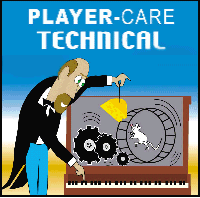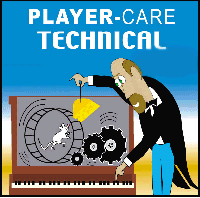
|

|

|

|

|

|
| Home | Manuals | Supplies | Search | Consult | Contact | Testing | Service |


"Tips and Tricks" |
|
This is very familiar problem. Watch the video.
I am often asked about 'the way the paper moves across the tracker bar'. Customers
tell me about 'jerky motion', sluggishness and generally uneven movement. These problems are becoming way too
familiar and indicate a common trend that is shortening the usable life of many player
pianos. So, I have devised a Simple Test that anyone can use
to determine if the air-motor is suffering from 'stiffness'
due to idleness. This page also has information about other problems like Sluggishness, Unevenness, Vacuum Leaks and one method to Reduce
or Delay the effect of Stiffness due to Idleness The '360 Test'1.) Remove the Front Panel, exposing the air-motor.
If your air motor is running unevenly, sluggishly or sounds like it's leaking, and
you have passed the '360 Test', click on the KeyWords....... Uneven....... Sluggish....... Leaking Your problem is Stiffness. The only total cure for this ailment is the
replacement of the pneumatic (or bellows) cloth. You can Do-It-Yourself. Stiffness can be caused by only Three things. Time, Environment and/or Idleness. Of the three, Time is the only one that cannot be interfered with or changed. All pneumatic (or bellows) cloth looses it's suppleness as it ages and nothing has as yet been devised to stop the process. It's effect can, however, be delayed, to a degree. Environmental conditions in your home play an important role in determining the life expectancy of all the cloth (and felt) in any pneumatically operated device. Information on this (and other) aspect/s of Player Piano Care can be found on The Rules Page. The last factor, which too often reduces the usable life and the
performance of the air-motor (and most other pneumatic devices), is Idleness. The USER alone determines this factor but
the effects of idleness can be delayed. Unfortunately, it is
often too late to start using delay tactics and the air-motor must be rebuilt.
The fact that the air-motor exhibits the symptom known as 'fly-back' or 'backlash',
indicates a problem. However, there are only Three possible explanations for this problem. First, it is entirely possible that the motor is entering
the first stage of stiffness due to idleness or age. At this point,
you should feel the cloth. It should be supple like a cotton shirt. If the cloth is
relatively supple, employing a delay tactic may greatly
reduce or even eliminate the fly-back.
Second, if the cloth feels like a starched shirt,
it is getting old and should probably be rebuilt.
However, it may have years of life left in it and I only recommend rebuilding if the
unevenness adversely effects the quality of the music. Third, something is impeding the movement of at least
one bellow. Remove the air-motor from the player and, while holding the sliding
valves in place, turn it upside-down and listen for any foreign debris moving around
inside. If any noise is detected, you may be able to remove it by removing the sliding
valve for that bellows and then 'shaking' it out. If the debris is firmly lodged in the
bellows, it will have to be rebuilt. The debris is most
likely stuck in the hinge and it is unlikely that it can be removed, but you can
try. Below is a video that shows how you can use your lungs to check various devices in a player piano.
Delay TacticsMost simply put, the best tactic to delay to the problems associated with idleness
is: The 180 Degree Repair Technique1.) With the ladder chain still disconnected, place the unit in the Reroll position.2.) Pump the treadles a few times, then stop. 3.) Note the exact position of the bellows when the air-motor stops turning. 4.) Repeat steps #2 and #3 until you feel you can pin-point where the unit stops almost every time. 5.) Reconnect the latter chain. 6.) The next time you are finished using the player piano for awhile; TURN THE CRANKSHAFT 180 DEGREES FROM IT'S TESTED RESTING POINT 7.) Repeat step #6 every time you're done using the unit. Note: The 'resting point' may not always be the same point that was found during the above test. However, the crankshaft should be placed at the point that IS 180 degrees from the point noted during the test. Air-Motor LeaksThe easiest way to test an air motor for leaks is to disconnect the vacuum supply hose that's connected to the motor and then seal the connector with a piece of duct or masking tape. Then, turn the drive gear in the opposite direction (or backwards) of the way the gear normally turns. If there is leakage in the motor, turning the gear backwards will be very easy. If there is no leakage, turning the gear backwards will be very difficult. There are numerous types of leaks that can
adversely effect the operation of virtually any air-motor. The most common type of leak occurs at the stress points (or
folds) in the bellows cloth. If these small holes are readily visible to the naked eye,
gluing small circles of thin pouch leather may
significantly improve the torque and reduce sluggishness
and/or unevenness. However, all repairs made to the cloth
(with the exception of loose glue joints or unnatural cuts) should be considered
temporary repairs. The easiest, most durable and most positive way to eliminate leakage
inside the main air channel is to seal off all valve holes with a good tape (like
duct tape) and pour in a healthy amount of Phenoseal right in the main supply
flange. Slosh it around for a minute or so and then pour out the excess and let
it dry for 24 hours. It's best to remove the tape about twenty minutes after you
pour out the excess to aid the drying process. Also, be sure to clean around the
holes in case any of the sealer got under the tape and onto the face of the block. UnevennessUneven rotation/movement of an air-motor can only occur when the bellows are
not all working with the same efficiency. To determine the cause of the problem, start
by performing the Simple Test at the beginning of this page. It
the air-motor passes all the tests and procedures then the problem is most likely located
in the drive train or the
transmission. SluggishnessBasically speaking, sluggishness in an air-motor is the result of leaks or some form of contamination. Air-motors can become
contaminated by a variety of things but the most common contaminates are TAR, OIL and GREASE. Unfortunately, novice technicians and
owners think that applying oil and/or grease to the metal and/or felt bearing surfaces
will improve the operation of the air-motor. Nothing could be further from the
truth. (I do apply one drop of MMO on new bearing felts when I rebuild an air-motor) Although applying these lubricants can temporarily improve motor operation, they actually ruin the felt permanently. If the lubricant leaches into the wood (as it usually does), replacing the contaminated felts may prove very difficult. Consult a Qualified Technician. Sluggishness and Tar
 Comments or Questions to: John A Tuttle (Site Owner) |

|
Since "Player-Care" is an internet business, I prefer that we correspond via E-Mail (click here to fill out the 'Request Form'). However, if I'm not in the middle of some other activity, you can reach me at 732-840-8787. But please understand that during the hours from 8AM-5PM EST (Mon-Sat), I'm generally quite busy. So, I probably won't answer the phone. If you get the answering machine, please leave a detailed message stating the reason for your call. Also, repeat your name and phone number clearly and distinctly. By necessity, I prioritize everything in my life. And, if you call and just leave your name and number, and ask me to call you back, it might be a day or two before I return your call. Why? Because I don't know why you want me to call and I might not be prepared to assist you in an effective and efficient manner. If you leave me an E-Mail address (which I prefer), spell it out phonetically. The more you do to help me, the more I can help you in return. Don't rush. You have four minutes to record your message. |
|
407 19th Ave, Brick, NJ, 08724 Phone Number 732-840-8787 (Voicemail Only, No Texts) |
